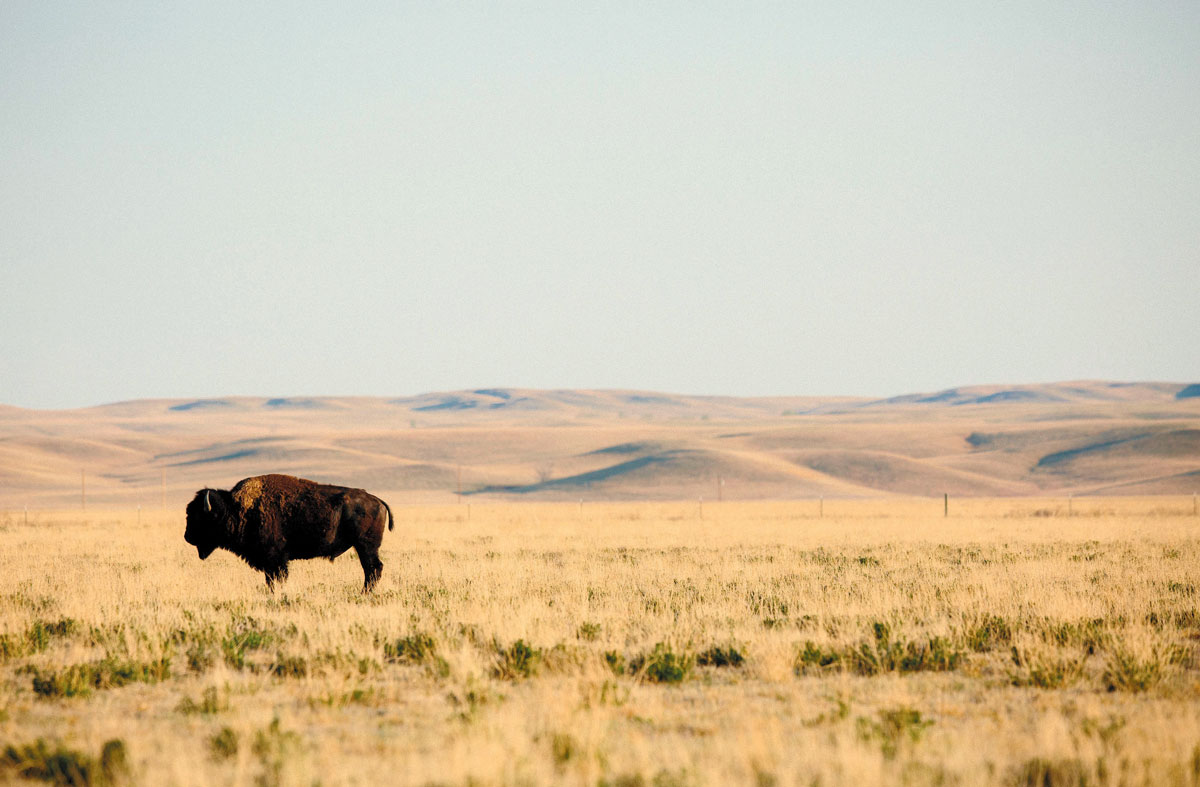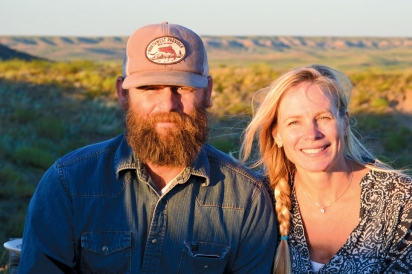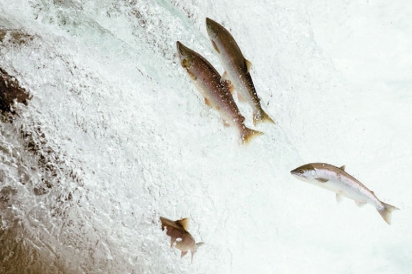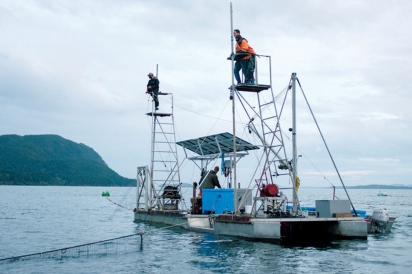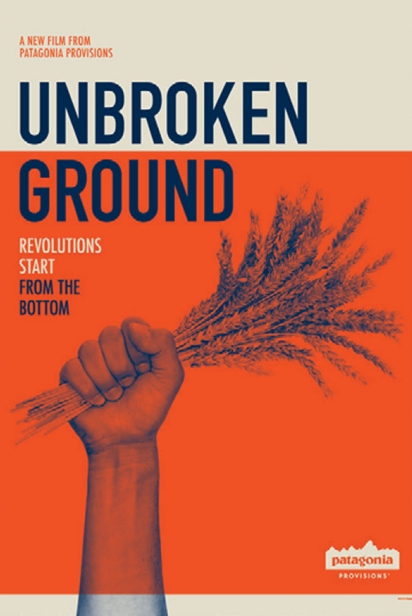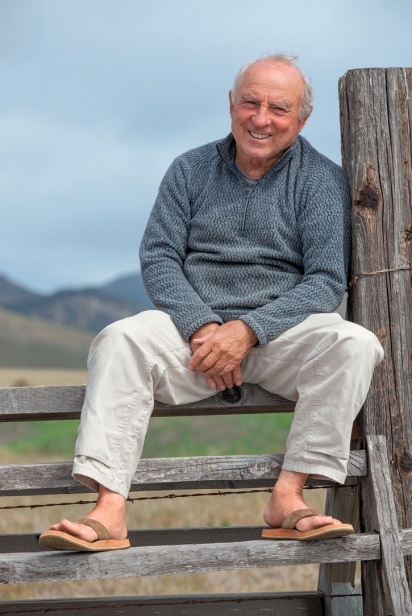Patagonia Provisions
The Outdoor Clothing Powerhouse’s Latest “Experiment” Aims to Revolutionize Sustainable Food Production
“I’ve always thought of my company, Patagonia, a clothing company, as an experiment–making decisions based on quality and responsibility. I can tell you that it is not an experiment any more. I have proven to myself: It works. Now, applying that to food is another story. This is another experiment. But I think it’s the most important experiment we’ve ever tried.”
—Yvon Chouinard, founder of Patagonia
What makes the production of any given food sustainable? When asked that question, most people are likely to say that sustainable food is produced organically or, perhaps, that it is grown without pesticides or herbicides, or that it involves no animal products. At Sausalito-based Patagonia Provisions, the newest venture from the highly successful outdoor clothing company Patagonia, the answer involves looking far beyond what most consumers currently think of as sustainable.
Founded by Yvon Chouinard, Patagonia holds at its core a commitment to making purchasing decisions based on quality and responsibility. The company helped revolutionize the garment industry as early as 1996 by committing to exclusively use organic cotton for its products. Similarly, Patagonia Provisions, Chouinard’s latest passion project, holds this “quality first” mission as its guiding force. The venture’s expanding line of food products is designed to revolutionize the landscape for all eaters, from Patagonia’s original core group of customers—mountain climbers—to home cooks, anyone who shares the desire to eat nutritious food that is sustainably sourced and also tastes terrific.
With food, Chouinard sensed a need to delve deeper than organics; that profound change at the basic level of our food system was required for the long-term health of agriculture and the soil that nurtures most of humanity’s food. Via its organic cotton program, as well as initiatives around preserving grasslands, “Patagonia had been involved with agriculture for a long time,” says Birgit Cameron, the long-time Marin County resident who is the director of Patagonia Provisions. “Yvon felt that, through the lens of food, we could reach more people.”
Cameron, who grew up in Canada in a family that ran a global import/export food business, developed a career in branding, design and food, eventually building her own company, which led her to Patagonia. “I had a chance to meet Rose [Patagonia CEO Rose Marcario] and we started talking about what a food business (for Patagonia) would look like,” says Cameron, who was invited to help launch the food venture.
Cameron got to work writing the business plan. And Marcario, Chouinard and Cameron went into the kitchen, designing foods whose inspiration came from meals they savored while adventuring.
Chouinard always recognized the power of correct foods eaten at the correct time. Patagonia Provisions’ Tsampa Soup, named for the barley that enriches it, is traditionally enjoyed by Tibetan Sherpa and helped fuel Chouinard during a trip to the Himalayan region. The quick-cooking soup (it’s ready in 10 minutes) epitomizes the expanding product line—nutritionally dense, exceptional flavor profile, as few ingredients as possible, ready in 10 minutes or less—that the creators were searching for. “We are building every day food with high nutritional density that is super-delicious,” said Cameron.
The biggest and most important task Cameron faced as Provisions came into being in 2012 was how to apply the environmental and ethical tenets of Patagonia to Patagonia Provisions. That meant looking first at creating a supply chain of ingredients for their developing product line.
Steeped in Patagonia’s innovative sourcing history and long-standing supplier relationships, Chouinard, Cameron and other members of Patagonia’s senior management team chose four pillars to guide the sourcing for their new company: regenerative farming, regenerative grazing, diversified crop development and restorative fishing. Taken separately, each pillar would significantly resonate with Chouinard’s motto of “first, do no harm.” Taken together, they just might be able to do much more. Or, as the company’s website says, “change our relationship to the land and the oceans.”
Regenerative Farming
Here, Patagonia Provisions looked to The Land Institute, a science-based research nonprofit founded and led by sustainable food icon Wes Jackson. Founded in Kansas in 1976, The Land Institute’s website states that its mission is to promote an alternative to current destructive agricultural practices. This includes advancing perennial grain crops and polyculture farming solutions. The Dust Bowl taught an earlier generation of Americans that, when treated improperly, soil—that unsexy material which nurtures our food supply—becomes a non-renewable resource. Jackson and his team aim to reverse that.
One of The Land Institute’s projects that Patagonia Provisions is supporting is the development of Kernza,® a perennial grain hybridized with an intermediate wheatgrass (Thinopyrum intermedium) related to wheat. The deep root structure of perennial plants like Kernza creates a continuous carbon loop, pulling carbon from the air to nurture the plant. This reduces farmers’ reliance on chemical fertilizer and, thus, petroleum consumption—all the needed carbon is already nearby. The deep root systems also slow or prevent natural erosion, not to mention the significant erosion caused by the required tilling of land planted to annual crops, and help hold moisture in the soil. The reduction in tilling also prevents or lessens the release of carbon previously stored by the plant in the soil that occurs during and after tilling.
Over 100 acres of Kernza are currently under cultivation by Patagonia Provisions, grown by The Land Institute, the University of Minnesota and other partners, primarily destined for the first beverage to be added to Patagonia Provisions’ ever-growing larder. Expected in early October this year is Patagonia Provisions’ new Kernza-based beer.
In an effort to develop greater awareness and, soon, a wider commercially viable market for Kernza, samples have been shared with innovative chefs, bakers and distillers to explore how it behaves in the kitchen and tastes in finished goods such as bread and whiskey. San Francisco’s The Perennial restaurant has been working with Kernza for over a year.
“We get about 20 pounds of it a week,” says Anthony Myint, The Perennial’s’ co-founder, who notes the grain’s nice, grassy flavor. “It is a core part of our program.” wThe Perennial makes bread using Kernza on a daily basis, and recently began making ice cream using cream steeped in day-old Kernza bread crusts. For autumn, Myint is considering a Kernza porridge or risotto.
Diversified Crop Development
Patagonia Provisions also supports efforts at The Bread Lab at Washington State University’s Mount Vernon Research Center to “look at grains outside of the top 10 currently grown in the United States,” says Cameron. Under the watchful eye of Dr. Steve Jones, director of The Bread Lab, and driven by the organic and local food movements, The Bread Lab is working “to determine which ones perform well for farmers and which are more suitable for craft baking, malting, brewing and distilling.”
In addition to supporting research, Provisions is also investing in infrastructure “to help develop back-end products and strong regional economies [that will allow and encourage the production of the desired ingredients],” says Cameron. In support of buckwheat, listed as the first ingredient in the company’s Tsampa Soup, Provisions invested in a milling facility in Washington’s Skagit Valley. This fall, Patagonia Provisions plans to introduce a new line of whole-grain hot cereals—Red Raspberry, Apple and Banana—which include buckwheat sourced from Skagit Valley.
Regenerative Grazing
Buffalo jerky, one of the earliest and a mainstay of the company’s product line, meets Patagonia Provisions’ steadfast criteria in selecting animal proteins. Raised, slaughtered and processed at Jill and Dan O’Brien’s Cheyenne River Ranch in South Dakota, the buffalo used for Provisions’ jerky are treated with respect at every step of their life. Consideration is taken to develop, or at times, resuscitate, some of the traditional and cultural connections that the native peoples fostered with this massive animal, an icon of the Great Plains that contributed to every facet of the Plains Indian tribes’ daily life. And by eliminating feedlots and other consequences of industrial agriculture, Cheyenne River Ranch’s operation significantly reduces sources of greenhouse gases usually inherent to sizeable ranching operations.
As Jill O’Brien says in Unbroken Ground, Patagonia Provisions’ new film that explores each of the four pillars of sustainable food production that Provisions is focusing on, “We are really grass farmers and the bison are one of the tools that help manage it.”
Unbroken Ground offers viewers a chance to meet some of Patagonia Provisions’ purveyors like the O’Briens, and to understand how the “revolutionary act” of farming can, quite literally, change the world. The film, produced by filmmaker Chris Malloy, was on tour this summer throughout the U.S. and can now be viewed on the company’s website.
Restorative Fishing
Patagonia Provisions’ sourcing criteria for its salmon products was equally stringent. Like buffalo, salmon is native to the North American continent and, like the company sought out Cheyenne River Ranch, it went looking for fisheries that harvest fish in the traditional methods utilized by the people native to the region. Washington’s Lummi Island Wild, featured in Unbroken Ground, uses a reef net catch system, which, says Kurt Beardslee of the Wild Fish Conservancy in the movie, “is passive gear that allows the fisherman to select targeted fish and release those that are not.” The wild pink salmon are handled one by one, eliminating by-catch. Anchored in place and close to shore, the boats burn no fuel as part of their fishing, eliminating another source of greenhouse gas emissions.
Provisions uses two sources for its line of salmon products: Lummi Island Wild pink salmon for its vacuum-packed smoked Black Pepper Salmon and wild Sockeye salmon from a community-based, in-river fishery on the Situk River in Alaska for its Original and Lemon Pepper flavors.
Working with Friends Old and New
“Yvon really perks up when you start talking about food,” says Peter Buckley of Front Porch Farms in Healdsburg, who has been friends with Chouinard since Doug Tompkins (the late co-founder of Esprit Corp. and The North Face clothing companies) introduced them on a kayaking trip in Chile in the late ‘60s. Buckley ran the European operations of Esprit before moving to Marin County and on to other projects, including Berkeley’s David Brower Center.
“Doug got into kayaking so he wanted all of his friends to get into kayaking,” joked Buckley, who noted that the three friends were always involved in environmental issues, and all three subsequently made moves into food and farming. “There’s a real attraction to farming,” says Buckley. “That word ‘regenerative’ is hopeful, it’s positive, it stops the focus on the negative.”
Buckley, whose Front Porch Farm was profiled in the Fall 2015 issue of Edible Marin & Wine Country, credits Chouinard with holding on to Patagonia. “Yvon did not sell [his company] because he saw the company as way to do good. The idea of agriculture, you can take things a bit further to do good, rather than just prevent harm.”
Environmental Working Group President and Co-Founder Ken Cook, who partners with Patagonia Provisions on a host of initiatives from GMO labeling to promoting climate-friendly agriculture, credits Provisions for their efforts to move the needle.
“It is companies like this that are turning this giant ocean liner that we call the food system in the right direction, that are trying to shift to positive momentum,” he said. Cook expressed a generational shift as well: “The environmental community grew up by saying ‘no’ and ‘stop.’ They did not build-in the capacity to try something different or here’s how you say ‘yes.’”
Chouinard, legendary to an earlier generation for his commitment to making a difference, is, in his way, passing the torch to a new generation of environmentalists, who, says Cook, “want to build businesses, to partner with businesses and make them allies in this effort.”
That said, Chouinard is not leaving the good fight quite yet. He clearly has a lot of energy left for this next “adventure.” As he told us, “I got really interested in food because I think we can actually restore the climate, restore the health of our food supply and rekindle the balance of nature through the ways in which we grow our food and catch our fish. That’s what Unbroken Ground, and Patagonia Provisions, is all about. Unbroken Ground is a propaganda film! We need for everyone to get behind the message that this film is telling.”
Cameron clearly feels the same way. “Patagonia Provisions was built to be a forum for like-minded thinkers, to help bring issues to light that are relevant to Patagonia Provisions,” she said. The company is deeply committed to “being the change” at all levels of the agriculture system, investing in a diverse array of organizations that are fomenting change, taking risks to build a better tomorrow. With company growth plans that seek two-and four-times growth year-to-year, Provisions is looking to have a significant impact on how and what we eat, now and in the future.
Eating as revolutionary act? Indeed.
Patagonia Provisions products are available at Patagonia stores nationwide and online at PatagoniaProvisions.com. Closer to home, look for them at Mill Valley’s Proof Lab Surf Shop and at the Mill Valley and Fairfax locations of Good Earth Natural Foods.


